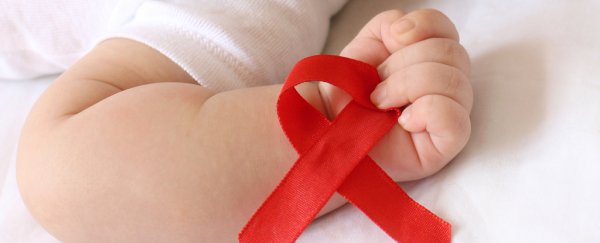The existence of modern antiretroviral drugs means HIV can be effectively held at bay, but cases of total remission are incredibly rare. Now, doctors have a new one to report.
A nine-year-old South African child who was diagnosed with HIV shortly after her birth in 2007 has now been in remission for eight-and-a-half years, scientists say – even though she only received anti-HIV drugs for a short period during her infancy.
It's only the third such case involving children in recent years – joining the 'Mississippi Baby' and the remission of a French child who successfully went drug-free for at least 12 years – and gives new hope that early treatment could lead to a virtual cure for HIV-infected babies.
"Further study is needed to learn how to induce long-term HIV remission in infected babies," says Anthony S. Fauci, director of the National Institute of Allergy and Infectious Diseases (NIAID), which funded the clinical trial nine years ago.
"However, this new case strengthens our hope that by treating HIV-infected children for a brief period beginning in infancy, we may be able to spare them the burden of life-long therapy and the health consequences of long-term immune activation typically associated with HIV disease."
In the study, HIV-infected infants were randomly assigned to receive either early or deferred antiretroviral therapy (ART).
The child in question, whose identity is being protected, received early treatment for 40 weeks along with 142 other babies.
Before treatment began, the child's blood showed very high levels of HIV. The child commenced ART at nine weeks of age, and at the end of the course of treatment, results indicated the viral load had been suppressed to undetectable levels.
For the next eight years the child didn't receive any antiretroviral medicine, but a follow-up analysis of stored blood samples taken during the interim showed that the virus had not returned.
But that didn't mean she had been cured. When researchers conducted a thorough analysis of the child's blood at nine-and-a-half years of age, they detected a reservoir of virus integrated into a tiny proportion of immune cells – called latent HIV – the sole remaining evidence of any HIV infection.
Otherwise, the child was free of symptoms, and had a healthy level of key immune cells.
While the case bears similarities to the Mississippi Baby – whose remission lasted 27 months before the virus returned – and the French child, the doctors say they've never seen such a finite and controlled burst of therapy deliver results like this before.
"To our knowledge, this is the first reported case of sustained control of HIV in a child enrolled in a randomised trial of ART interruption following treatment early in infancy," says one of the lead researchers, Avy Violari from the University of the Witwatersrand in South Africa.
Beyond that, the team hopes that further research might be able to highlight what it is about the child's physiology that led to such a successful treatment – especially since they don't think early ART by itself can explain the result here.
"We don't believe that antiretroviral therapy alone can lead to remission," Violari told the BBC.
"We don't really know what's the reason why this child has achieved remission – we believe it's either genetic or immune system-related."
At the same time, the team's analysis suggests that the child doesn't exhibit genetic characteristics associated with spontaneous control of HIV without the therapy – meaning it's likely that somehow the interplay between the short, early treatment and her body was able to induce her immune system to control HIV replication, creating a long-lasting and hopefully permanent remission.
Just what that mechanism was remains to be seen, but it's an incredibly inspiring puzzle to solve – and a wonderful result to be thankful for in the meantime.
The update on the research was presented at the 9th International AIDS Society Conference on HIV Science in Paris on Monday.
